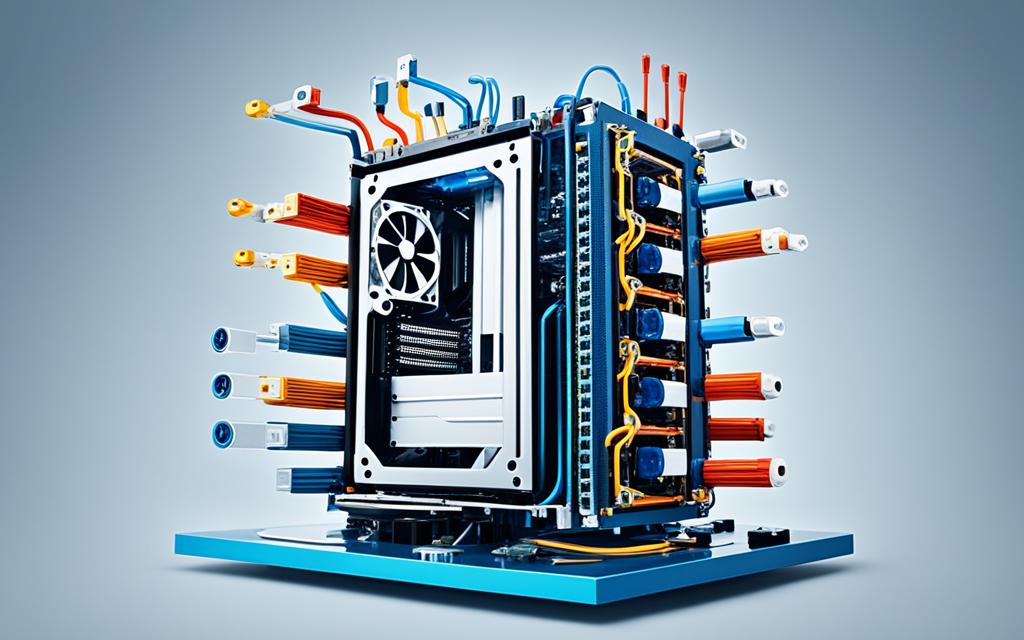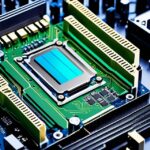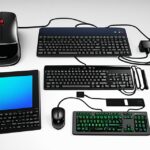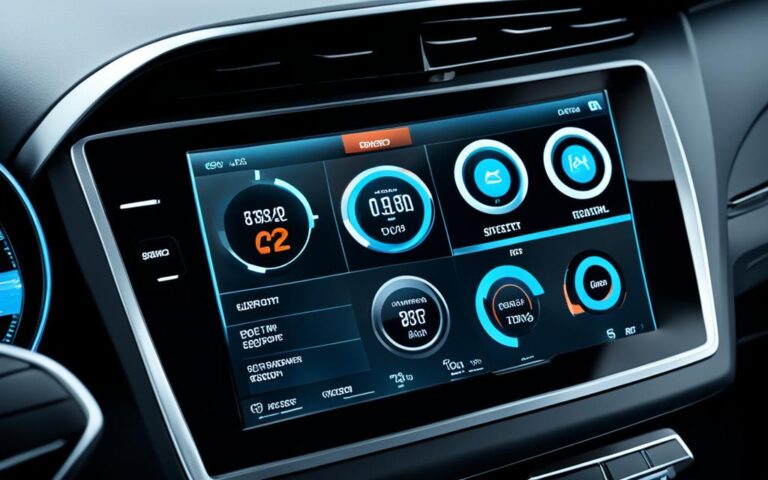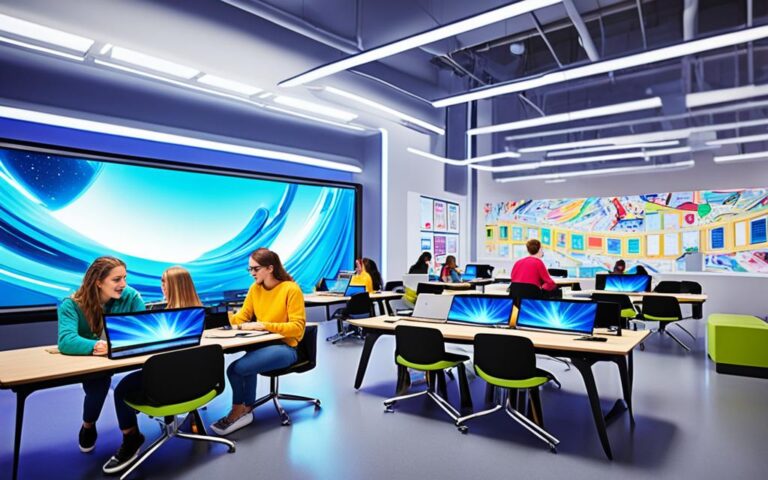Computers are key in our digital world, changing how we work and live. It’s vital to know how they work to move easily in this digital space. We’ll look at the basic tech and the magic behind every action and command. This will help us understand what makes computers so powerful.
Key Takeaways:
- Computers come in various shapes and sizes to fit different budgets1
- Basic functions of computers include Input Function, Processing Function, Output Function, and Storage Function12
- Primary input devices for computers include keyboards, mice, and joysticks1
- Devices like webcams and microphones allow input in video, audio, or image forms1
- Central Processing Unit (CPU) is responsible for processing raw data in a computer13
- Modern computers often use Accelerated Processing Unit (APU) combining CPU and GPU1
- CPU consists of Control Unit, Arithmetical Logical Unit (ALU), and Memory Unit1
- Monitor is a primary output device, while headphones and speakers are used for sound output1
- Output data can be stored as soft copy (e.g., on storage devices) or hard copy (e.g., through printers)1
- Storage functions involve temporary memory (RAM), permanent storage (internally or externally), SSDs/HDDs, and cloud storage1
Why Understanding Computer Operating Basics is Essential
In today’s digital world, knowing how to use a computer is a must. It opens doors to new learning and career chances. It helps you build more skills and move through the digital world with ease. It also makes you more confident in handling tech tasks, like school projects or fixing computer problems.
StatCounter Global Stats show that Windows is the top operating system, with over 80% of the market4. Less than 10% use macOS, and less than 2% use Linux4. Most new PCs come with Windows, making it the most used OS globally4.
For those in Computer Science or IT, knowing about computer parts like CPUs, RAM, and motherboards is key5. These parts are the heart of computers. Also, understanding peripherals like keyboards and monitors makes using computers better5.
Jobs in tech are expected to grow by 21% from 2021 to 2031, which is faster than average6. Most mid-level jobs need digital skills, like using Microsoft Office and social media6. This shows how important computer skills are for doing well in school and work.
Digital tools also help us grow personally. A Pew Research Center study found 73% of adults use YouTube to learn new things6. Seniors who use the internet and devices feel more connected, mentally active, and happy, says a survey by AARP6.
Learning about computers opens many doors in different fields. It helps with school, work, or just getting around online with confidence. In today’s tech-filled world, computer skills are a big part of success.
Benefits of Knowing Computer Operation Fundamentals
Learning about computer hardware and software basics is like the first step in reading a book. It helps manage academic projects, organize digital files, and troubleshoot basic computer problems7.
With computer skills, students can easily handle academic tasks and produce top-notch work. They can use software and applications smoothly, making research and analysis for assignments easier.
For academic projects, having a computer and knowing how to use it is key. Students can access many online resources like research databases and educational websites. This helps improve their learning and leads to better grades.
Knowing how to manage digital files is a big plus of having computer skills. No more digging through piles of papers for a specific document. With computer organization skills, files are easy to find and keep track of.
Understanding computer basics also helps with troubleshooting. It lets people fix simple computer issues. Knowing how to update software and solve common problems saves time and reduces stress7.
Also, having a strong grasp of computer operation boosts problem-solving skills and critical thinking. It teaches people to think logically and solve technical problems step by step.
In summary, knowing computer operation basics gives people confidence in the digital world. It supports academic success, helps with organizing files, and fixes basic computer problems. This leads to more productivity and independence.
How Computer Skills Impact Everyday Life
Computer skills are now key to our daily lives. They play a big role in many areas and open up new chances for people. Knowing the basics of computers and operating systems8 helps with research, making presentations, and working together online.
Today, having computer skills is a must8. With so much info online, these skills let people find and use knowledge easily. They help with both school research and personal interests.
Computer skills also change how we present information. They let people make slideshows and reports that grab attention9. Being good with presentation software boosts how well we communicate and tell stories with visuals. This skill is important in many areas, from school to work to the arts.
Online collaboration is another area where computer skills matter a lot. Working together online is common now. Being good with computers means you can join in and work well with others, no matter where they are8. You can share files and talk with others easily, making teamwork across distances possible.
Having strong computer skills also opens up more job options. Many jobs now want specific computer skills9. For example, skills in data analytics are in demand in marketing, management, and science9. Knowing how to use software like Microsoft Office is also key for getting work done efficiently9. Programming skills give a boost in web development, programming, and analyzing systems9.
Computer skills are important for more than just personal and career growth. They also help the economy grow. The digital economy is getting bigger, making up a big part of the world’s GDP10. By 2022, a lot of the world’s GDP will be digital, showing how important digital skills are10. In the US, most jobs now need some digital skills10. Not having enough skilled people in computer science can hurt the economy10.
In conclusion, computer skills are vital for our daily lives. They help with research, presentations, working together online, and offer great career chances. As our world gets more digital, learning computer skills is key for growing personally, professionally, and economically.
Exploring Key Computer Operating Concepts
To get to the heart of how computers work, we must explore key concepts. These include computer hardware basics, software basics, internal and external components, and file management. Understanding these is vital for grasping computer operations.
Computer Hardware Basics
Computer hardware is the physical bits that make up a computer. Knowing about these is key to understanding how a computer works and what it can do. It includes parts like the CPU, RAM, storage drives, and input/output devices. The operating system makes sure these parts work together smoothly without user programs getting in the way11.
Computer Software Basics
Software is made up of programs and data that let a computer do specific tasks. It covers operating systems, apps, utilities, and languages. The main job of the operating system is to make using the computer easier and use resources well11. It also handles memory, devices, security, and talks to other software and users1112.
Internal Components
Inside a computer, there are key parts that make it work. The CPU is like the brain, doing calculations and following instructions. RAM helps the computer get to data fast. Storage drives, like HDDs and SSDs, keep data and programs safe. Knowing about these parts helps us see how a computer processes and stores information.
External Components
External parts let us interact with the computer. This includes the monitor, keyboard, mouse, and speakers, plus devices like printers and webcams. Getting to know these parts helps with tasks like making documents, browsing the web, and enjoying multimedia. For example, a good monitor and keyboard can make computing better.
File Management
File management is about organizing, storing, and finding digital files on a computer. A good file system keeps data safe, organized, and easy to find. The operating system is key in managing files, keeping track of where they are, who can access them, and making sure they’re safe from unauthorized access11. Good file management keeps a computer tidy and efficient.
Mastering Essential Computer Operations
Learning the basics of computers is key for every student. Skills like charging a laptop, restarting it, taking screenshots, and fixing common problems help students keep their devices running well. These skills also help them solve issues quickly and use computers for school work.
It’s vital to know how to charge your laptop battery. Just plug it in and let it charge fully to keep it going all day13.
Restarting your laptop is a must-know skill. It fixes small software problems and boosts speed. This simple step clears out temporary glitches, making your computer work better14.
Taking screenshots is useful for school. You can capture important info from websites, save images for presentations, or record your work14.
Being able to fix common computer issues is a big plus. Students can handle problems like frozen programs, slow speeds, or network issues on their own. This keeps their laptops running smoothly14.
Benefits of Mastering Essential Computer Operations
Learning these computer basics has many perks for students:
- It helps keep your laptop running longer
- Boosts your problem-solving skills and makes you more independent
- Helps you use computers better for school
- Makes you more productive and helps with time management
- Helps prevent and fix common tech problems quickly
Knowing how to charge your laptop, restart it, take screenshots, and fix issues makes you tech-savvy. This lets you use technology fully for your school work.
Troubleshooting Common Computer Operating Issues
Computers often have problems. Knowing how to fix them is key. For example, a blinking laptop power button might mean battery or hardware issues15. To fix it, check the power, battery health, or do a hard reset15. Learning to spot and solve these problems makes using a computer better.
When troubleshooting, following certain steps helps. These steps include:
- Start with common causes: First, look for known problems before checking each part15.
- Use troubleshooting methods: These methods help find and fix computer issues. For example, CompTIA focuses on these methods in their training16. They start with the OSI model, a seven-layer network model16.
- Gather information: First, collect all the details about the problem and figure out the likely cause15. This helps for future fixes and to avoid the same issue later15.
- Plan your actions: Make a clear plan to solve the problem. Test and choose the best solution, then see how it works15.
- Use many resources: Look at manuals, guides, and get help from experts and online15. Sometimes, experts in forensic science are needed for complex issues15.
- Keep a record: Keeping track of what you do is important. It helps share knowledge, talk to others, and keep a record of your steps and findings16.
When you face computer problems, knowing what to do helps. For example, if a PC won’t start, check the power cable first17. If it turns on but doesn’t show anything, it’s likely a hardware problem17. Diagnostic codes or beeps from the motherboard can help find the issue17. If it keeps turning on and off, it might be a short circuit17.
These steps can help fix common computer issues. Troubleshooting is about trying different things until you find the solution15. By using these methods, you can fix problems and stop them from happening again151617.
References:
- 15 Troubleshooting statistics from link 1
- 16 Troubleshooting statistics from link 2
- 17 Troubleshooting statistics from link 3
Further Resources for Improving Computer Skills
There are many ways to learn basic computer skills and improve computer skills. You can find online courses, tutorials, community workshops, and educational programs. These options help you learn at your own pace and level. It’s important to keep learning and trying out new software and tools. Doing small projects and practicing helps you get better at using computers.
For a good start in computer skills, check out the top 10 computer literacy skills. This guide lists the key skills you need for today’s digital world. It covers things like typing, using computers, word processing, and more. The courses offer a wide range of knowledge to help you excel in computer use.
A 2018 study found that 75 percent of U.S. eighth-graders lacked basic computer skills18. This shows how important it is to teach computer skills, especially to students. By learning these skills, students can easily use technology for school and work.
Students should learn basic computer skills at school. By high school, they should know how to use Microsoft Office programs like Word, Excel, and PowerPoint. These skills help with communication, managing data, and making presentations. With over 1.2 billion users using Microsoft Office in 202019, having these skills is crucial.
Knowing how to use web browsers like Chrome, Firefox, Edge, or Safari is important today. Students should learn to navigate the internet safely and manage their computer files well. Teaching these skills early helps students use computers better on their own.
Table:
| Age Group | Screen Time (Average) | Typing Speed (Words per Minute) |
|---|---|---|
| 8-12 | 4-6 hours | 15-25 |
| Middle School | – | 15-25 |
Today’s kids spend a lot of time on screens, making computer skills education vital18. It’s important to teach them how to use technology wisely and safely.
For more computer skills, check out 5 ways to improve your computer skills. Places like Neway Directions offer courses and training in a flexible setting. This lets you learn at your own pace with instructors who help you improve.
Using these resources and keeping up with learning helps build strong computer skills. With technology always changing, it’s key to stay updated and adaptable to succeed in today’s digital world.
The Evolution of Computers
To truly appreciate computer fundamentals, it’s key to see how computers have changed. They’ve moved from early machines using vacuum tubes to today’s computers with microprocessors, personal computers, and mobile devices.
“In 1941, Konrad Zuse designed the Z3 computer capable of performing floating point binary math.”20
“The UNIVAC 1, introduced in 1951, weighed 29,000 pounds and contained 5,200 vacuum tubes.”20
“IBM released five different System/360 models in 1964 targeting scientific and business customers.”20
“The Olivetti Programma 101, launched in 1965, was a calculator capable of performing basic mathematical processes.”20
“The Apple-I, introduced in 1976, only sold about 200 units.”20
“Apple sold millions of Apple-II computers between 1977 and 1993.”20
“Introduced in 1981, IBM’s first IBM PC utilized the Microsoft MS-DOS operating system.”20
“The Commodore C64, released in 1982, featured 64 KB of RAM and cutting-edge graphics technology.”20
“In 1993, Apple released the Newton, a personal data assistant known as a PDA.”20
“Sony’s Vaio line of computers, launched in 1996, featuring a new three-dimensional interface, was discontinued in 2014.”20
“The iPhone was introduced by Apple in 2007, offering Internet browsing, music, and phone capabilities.”20
“The MacBook Air, launched in 2008, featured reduced size due to a smaller hard drive design.”20
“Apple released the first iPad in 2010, offering a larger screen without phone capabilities.”20
“Raspberry Pi launched a credit card-sized computer in 2012, weighing 45 grams.”20
“In 2015, Apple introduced the Apple Watch, further reducing computer size and compatibility with iPhones and MacBooks.”20
Each generation has brought us smaller, faster, and more powerful computers. This has changed the technology world. Knowing about computer history helps us understand modern computing better.
Conclusion
Understanding how computers work is key to moving through the digital world. It opens doors to many career paths in computer science and IT. Skills in computer basics help people succeed in fields like software development and cybersecurity21.
Learning the basics of computers is vital for doing well in your job. It means knowing how computers are built and how programming works. This knowledge is essential for success2223.
Knowing how computers work helps solve common problems and keeps work running smoothly. It makes using operating systems easier, helping manage tasks and files well23.
In today’s fast-changing digital world, always learning and staying curious is important. As technology advances, the need for those who understand computer basics will grow. By keeping up with new tech and improving skills, people can find and make new career chances in computer science and IT2122.
FAQ
Why is understanding computer functions important?
Computers are key in our digital world, changing how we work and live. Knowing how they work helps us use their power well. It makes us confident in the digital world.
How does understanding computer operating basics benefit us?
Knowing how computers work is vital for school and work chances. It helps us build more skills and move easily in the digital world.
What are the benefits of knowing computer operation fundamentals?
Knowing how computers work helps us manage school projects and organize files. It also helps us fix simple computer problems. These skills make us more independent in tech tasks.
How do computer skills impact everyday life?
Computer skills let us research, make presentations, and communicate online better. They help us succeed in a world where working together online is common.
What are the key concepts of computer operation?
Key concepts include hardware, software, internal and external parts, and managing files. These help us understand how computers work, store data, and manage tasks.
What are some essential computer operations to master?
Mastering skills like charging laptops, restarting them, taking screenshots, and fixing common problems is crucial. These skills help us maintain devices, solve problems, and use computers well.
How can we troubleshoot common computer operating issues?
To fix common computer problems, identify and solve software, connectivity, or hardware issues. Check power and battery connections to solve many problems. This improves our computer use.
What resources are available for learning and enhancing computer skills?
Many resources like online courses, tutorials, workshops, and programs help us learn computer skills. Keeping up with new software and tools is important. Trying different apps and small projects helps us learn better.
How has the evolution of computers shaped the technology landscape?
Computers have changed from vacuum tube machines to today’s fast, powerful devices. Knowing how they evolved helps us appreciate modern computing more.
What are the opportunities in computer science and information technology with a solid understanding of computer fundamentals?
Knowing computer basics opens doors in careers like software development, cybersecurity, and data science. It prepares us for the digital age and exciting jobs.
Source Links
- https://artoftesting.com/functions-of-computer – Functions of Computer Explained
- https://www.computernetworkingnotes.com/networking-tutorials/basic-functions-of-a-computer-explained.html – Basic Functions of a Computer Explained
- https://giveitgetit.org/understanding-computer-operating-basics/ – A Beginner’s Guide To Understanding Computer Operations
- https://edu.gcfglobal.org/en/computerbasics/understanding-operating-systems/1/ – Computer Basics: Understanding Operating Systems
- https://www.lincolntech.edu/news/information-technology/basic-computer-hardware-essentials-networking-student – Basic Computer Hardware – Learn the Essentials
- https://www.simplilearn.com/computer-skills-and-their-importance-article – What Are Computer Skills and Their Importance [2024]
- https://www.computerhope.com/issues/ch001796.htm – Why Should I Learn About Computers?
- https://www.giveitgetit.org/understanding-computer-operating-basics/ – A Beginner’s Guide To Understanding Computer Operations
- https://www.coursera.org/articles/computer-skills – Computer Skills: What They Are and How to Improve Them
- https://www.learning.com/blog/why-do-students-need-to-study-computer-fundamentals-programming/ – What Are Computer Fundamentals & Why Are They Important?
- https://www.geeksforgeeks.org/functions-of-operating-system/ – Functions of Operating System – GeeksforGeeks
- https://www.studysmarter.co.uk/explanations/computer-science/computer-systems/operating-systems/ – Operating Systems: Functions, Types, Examples
- https://www.physicsforums.com/threads/mastering-computer-basics-for-beginners.1008672/ – Mastering Computer Basics for Beginners
- https://edu.gcfglobal.org/en/computerbasics/inside-a-computer/1/ – Computer Basics: Inside a Computer
- https://www.techtarget.com/whatis/definition/troubleshooting – What is troubleshooting and why is it important?
- https://www.comptia.org/blog/troubleshooting-methodology – Use a Troubleshooting Methodology for More Efficient IT Support
- https://www.digitaltrends.com/computing/pc-troubleshooting-guide/ – Computer Won’t Turn On? Common Problems and Possible Fixes | Digital Trends
- https://www.connectionsacademy.com/support/resources/article/7-computer-skills-to-master-by-high-school/ – 8 Basic Computer Skills to Master Before High School – Connections Academy®
- https://www.newaydirections.com/2020/08/16/5-ways-to-improve-your-computer-skills/ – 5 Ways to Improve Your Computer Skills – Neway Directions
- https://www.bookyourdata.com/blog/computers-changed-history – The Evolution of Computers & Computer Timeline – Bookyourdata
- https://unacademy.com/content/nta-ugc/study-material/computer-science/basic-structure-of-computer/ – Basic Structure of Computer
- https://people.eecs.berkeley.edu/~bh/pdf/ssch26.pdf – PDF
- https://geeksforgeeks.org/functions-of-operating-system/ – Functions of Operating System – GeeksforGeeks
